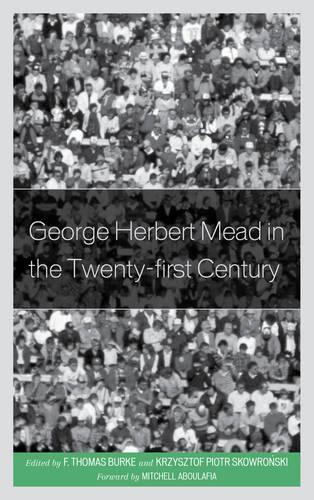
George Herbert Mead in the Twenty-first Century
(Paperback)
Publishing Details
George Herbert Mead in the Twenty-first Century
By (Author) F. Thomas Burke
Edited by Krzysztof Skowronski
Contributions by Mitchell Aboulafia
Contributions by Guido Baggio
Contributions by Joseph Betz
Contributions by Kelvin J. Booth
Contributions by Nuria Sara Miras Boronat
Contributions by Brigadier General James D. Campbell
Contributions by Gary A. Cook
Contributions by Stephen Everett
Bloomsbury Publishing PLC
Lexington Books
6th March 2017
United States
Classifications
Professional and Scholarly
Non Fiction
Social and political philosophy
191
Physical Properties
Paperback
248
Width 150mm, Height 231mm, Spine 21mm
408g
Description
This volume is composed of extended versions of selected papers presented at an international conference held in June 2011 at Opole Universitythe seventh in a series of annual American and European Values conferences organized by the Institute of Philosophy, Opole University, Poland. The papers were written independently with no prior guidelines other than the obvious need to address some aspect of George Herbert Meads work. While rooted in careful study of Meads original writings and transcribed lectures and the historical context in which that work was carried out, these papers have brought that work to bear on contemporary issues in metaphysics, epistemology, cognitive science, and social and political philosophy. There is good reason to classify Mead as one of the original classical American pragmatists (along with Charles Peirce, William James, and John Dewey) and consequently as a major figure in American philosophy. Nevertheless his thought has been marginalized for the most part, at least in academic philosophy. It is our intention to help recuperate Meads reputation among a broader audience by providing a small corpus of significant contemporary scholarship on some key aspects of his thought.
Reviews
The reception of G.H.Mead's seminal ideas has gone through enormous ups and downs. Little known outside Chicago during his lifetime, he became, from the 1930s on, a classic of sociology through some of his posthumous publications. In connnection with a widespread renaissance of pragmatism in the 1980s, he was recognized as a crucial member of this philosophical school. And while the enthusiasm may have abated a little bit around 2000, this book is an indicator for the continuing vitality of Mead's thinking on the international scene. This collection is a welcome addition to the growing field of Mead studies. -- Hans Joas, Ernst Troeltsch Professor for the Sociology of Religion at the Humboldt University of Berlin
Author Bio
Krzysztof (Chris) Piotr Skowronski, PhD, teaches Contemporary Philosophy, Aesthetics, Cultural Anthropology, Polish Philosophy, and American Philosophy at the Institute of Philosophy, Opole University, Poland. He co-organizes annual conferences on American and European Values. He authored books: Values and Powers. Re-reading the Philosophical Tradition of American Pragmatism (Rodopi in 2009) and Santayana and America. Values, Liberties, Responsibility (Cambridge Scholars 2007). He co-edited books: (with Matthew Flamm) Under Any Sky. Contemporary Readings of George Santayana (Cambridge Scholars 2007); (with Matthew Flamm and John Lachs) American and European Values: Contemporary Philosophical Perspectives (Cambridge Scholars 2008); (with Larry Hickman, Matthew Flamm and Jennifer Rea) The Continuing Relevance of John Dewey: Reflections of Aesthetics, Morality, Science, and Society (Rodopi 2011); (with Kelly Parker) Josiah Royce for the Twenty First Century (Lexington 2012); and (with Cornelis de Waal) The Normative Thought of Charles S. Peirce (Fordham, 2012). F. Thomas Burke, PhD, is a professor in the Department of Philosophy at the University of South Carolina, USA. Burke is the author of Deweys New Logic (University of Chicago Press, 1994), and What Pragmatism Was (Indiana University Press, 2013), and is co-editor (with Micah Hester and Robert Talisse) of Deweys Logical Theory: New Studies and Interpretations (Vanderbilt University Press, 2002).
